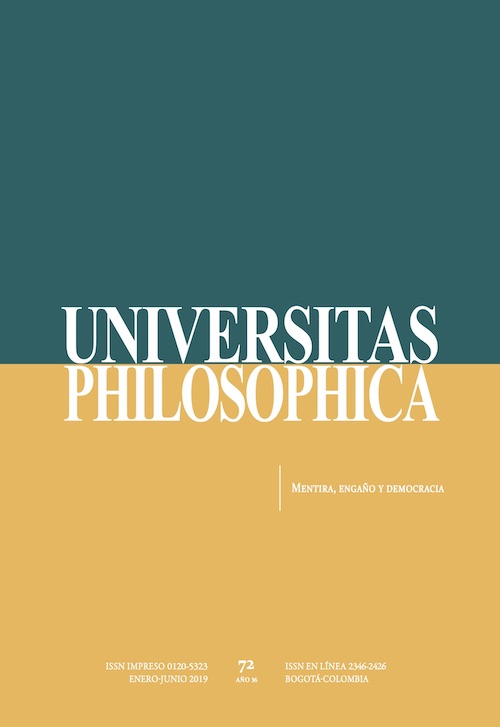Resumen
Este artículo se propone sistematizar distintas opciones de conceptualización de la mentira para así clarificar el sentido de la posverdad contemporánea. Ante las limitaciones de la reconstrucción histórica de las acepciones de la mentira legadas por la tradición filosófica y debido a que el análisis conceptual corre el riesgo de fetichizar la afirmación mentirosa, apostamos por enriquecer la conceptualización de la mentira a través de la descripción lexicográfica del sentido prototípico y de las variantes del vocabulario idiomático de la mentira. Al distinguir las condiciones formales del decir una mentira y los matices situacionales de la realización del mentir, se puede reconocer en la posverdad contemporánea un nuevo régimen de la mentira.
Adler, J. E. (1997). Lying, Deceiving, or Falsely Implicating. The Journal of Philosophy, 94(9), 435-452.
Ball, J. (2017). Post-Truth: How Bullshit Conquered the World. London: Biteback Publishing.
Black, M. (1982). The Prevalence of Humbug. Philosophical Exchange, 13(1), artículo 4. Recuperado de https://digitalcommons.brockport.edu/phil_ex/vol13/iss1/4
Blecua, J. M. (Dir.). (2002). Diccionario avanzado de sinónimos y antónimos de la lengua española. Barcelona: VOX.
Bok, S. (1979). Lying: Moral Choice in Public and Private Life. New York: Vintage Books.
Carson T. L. (2010). Lying and Deception: Theory and Practice. New York: Oxford University Press.
Chisholm, R. M., & Feehan, T. D. (1977). The Intent to Deceive. The Journal of Philosophy, 74(3), 143-159.
Cooke, N. A. (2017). Posttruth, Truthiness, and Alternative Facts: Information Behavior and Critical Information Consumption for a New Age. Library Quarterly: Information, Community, Policy, 87(3), 211-221.
Cruz, M. (2017). La posverdad: entre la falsedad y el engaño. Uno, 27, 29-30.
D’Agostini, F. (2013). Mentira. Buenos Aires: Adriana Hidalgo Editora.
Dynel, M. (2011). A Web of Deceit: A Neo-Gricean View on Types of Verbal Deception. International Review of Pragmatics, 3, 139-167.
Fallis, D. (2012). Lying as a Violation of Grice’s First Maxim of Quality. Dialectica, 66(4), 563-581.
Faulkner, P. (2007). What is Wrong with Lying? Philosophy and Phenomenological Research, 75(3), 524-547.
Frankfurt, H. G. (2006). On Bullshit. Sobre la manipulación de la verdad. Barcelona: Paidós.
Grice, H. P. (2005). Lógica y conversación. En: L. M. Valdés Villanueva (Comp.) La búsqueda del significado. Lecturas de Filosofía del lenguaje (4ª ed.) (pp. 491-519). Madrid: Tecnos.
Grocio, H. (1925). Del derecho de la guerra y de la paz (Vol. III). Madrid: Reus.
Harsin, J. (2015). Regimes of Posttruth, Postpolitics, and Attention Economies. Communication, Culture & Critique, 8, 327–333.
Kant, I., & Constant, B. (2012). ¿Hay derecho a mentir? (La polémica Immanuel Kant-Benjamin Constant sobre la existencia de un deber incondicionado de decir la verdad). Madrid: Tecnos.
Keyes, R. (2004). The Post-Truth Era: Dishonesty and Deception in Contemporary Life. New York: St. Martin’s Press.
Lackey, J. (2013). Lies and Deception: An Unhappy Divorce. Analysis, 73(2), 236-248.
Mahon J. E. (2015). The Definition of Lying and Deception. En: E. N. Zalta (Ed.). The Stanford Encyclopedia of Philosophy. Recuperado de: http://plato.stanford.edu/entries/lying-definition/
Meibauer, J. (2018). The Linguistics of Lying. Annual Review of Linguistics, 4, 357-375.
Montaigne, M. (1992). De los mentirosos. En: Ensayos (Vol. I) (pp. 69-74). Madrid: Cátedra.
Montaigne, M. (1998). Del mentir. En: Ensayos (Vol. II) (pp. 414-419). Madrid: Cátedra.
Real Academia Española (2014). Diccionario de la lengua española (23ª ed.). Madrid: Espasa.
San Agustín (1954). Sobre la mentira. En: Obras de San Agustín, Tratados morales (Vol. XII) (pp. 529-609). Madrid: Biblioteca de Autores Cristianos.
Shibles, W. (1988). A Revision of the Definition of Lying as an Untruth Told with Intent to Deceive. Argumentation, 2, 99-115.
Shiffrin, S. V. (2014). Speech Matters. On Lying, Morality and the Law. Prince-ton: Princeton University Press.
Sorensen, R. (2010). Knowledge-lies. Analysis, 70(4), 608-615.
Williams, B. (1996). Truth, Politics, and Self-Deception. Social Research, 63(3), 603-617.
Williams, B. (2002). Truth and Truthfulness: An Essay in Genealogy. Princeton: Princeton University Press.
Esta revista científica se encuentra registrada bajo la licencia Creative Commons Reconocimiento 4.0 Internacional. Por lo tanto, esta obra se puede reproducir, distribuir y comunicar públicamente en formato digital, siempre que se reconozca el nombre de los autores y a la Pontificia Universidad Javeriana. Se permite citar, adaptar, transformar, autoarchivar, republicar y crear a partir del material, para cualquier finalidad (incluso comercial), siempre que se reconozca adecuadamente la autoría, se proporcione un enlace a la obra original y se indique si se han realizado cambios. La Pontificia Universidad Javeriana no retiene los derechos sobre las obras publicadas y los contenidos son responsabilidad exclusiva de los autores, quienes conservan sus derechos morales, intelectuales, de privacidad y publicidad.
El aval sobre la intervención de la obra (revisión, corrección de estilo, traducción, diagramación) y su posterior divulgación se otorga mediante una licencia de uso y no a través de una cesión de derechos, lo que representa que la revista y la Pontificia Universidad Javeriana se eximen de cualquier responsabilidad que se pueda derivar de una mala práctica ética por parte de los autores. En consecuencia de la protección brindada por la licencia de uso, la revista no se encuentra en la obligación de publicar retractaciones o modificar la información ya publicada, a no ser que la errata surja del proceso de gestión editorial. La publicación de contenidos en esta revista no representa regalías para los contribuyentes.


